
EUROPEAN JOURNAL OF ENTOMOLOGY
Scope & Guideline
Showcasing European excellence in insect science.
Introduction
Aims and Scopes
- Insect Physiology and Immunology:
Research focusing on the physiological mechanisms and immune responses of insects, including studies on gene expression and molecular pathways. - Ecological Interactions and Behavior:
Exploration of behavioral ecology, including trophic interactions, predator-prey dynamics, and the impact of environmental factors on insect behavior. - Taxonomy and Systematics:
Detailed studies on the classification, identification, and evolutionary relationships among insect species, often including descriptions of new species. - Insect Management and Conservation:
Research aimed at pest management strategies and conservation efforts, emphasizing the ecological roles of insects in agriculture and natural ecosystems. - Insect Diversity and Biogeography:
Studies that examine the patterns of insect diversity across different habitats and geographic regions, contributing to our understanding of biodiversity and conservation.
Trending and Emerging
- Molecular and Genomic Studies:
An increasing number of studies explore molecular genetics and genomic approaches, focusing on gene expression, stress responses, and evolutionary adaptations in insects. - Impact of Climate Change on Insects:
Research addressing the effects of climate change on insect populations, distributions, and interactions is on the rise, highlighting the urgency of understanding ecological responses to global warming. - Citizen Science and Public Engagement:
There is a growing trend in utilizing citizen science data to enhance research on insect diversity and phenology, reflecting a broader movement towards public involvement in scientific research. - Ecotoxicology and Environmental Stressors:
Studies investigating the effects of pesticides and other environmental stressors on insect health and ecology are increasingly common, emphasizing the importance of understanding anthropogenic impacts. - Trophic Interactions and Food Web Dynamics:
Research focusing on complex trophic interactions among insects and their environments is gaining traction, contributing to a better understanding of ecosystem dynamics and stability.
Declining or Waning
- Insect Developmental Biology:
Research on developmental processes in insects, such as metamorphosis and diapause, has seen a reduction in publications, possibly overshadowed by more applied studies in ecology and pest management. - Traditional Taxonomy without Molecular Approaches:
While traditional taxonomy remains important, studies focusing solely on morphological traits without incorporating molecular techniques are becoming less common, as researchers increasingly adopt integrative taxonomic methods. - Basic Behavioral Studies:
There is a noticeable decrease in publications focusing on basic behavioral studies of insects that do not intersect with ecological or applied contexts, indicating a shift towards more applied research themes.
Similar Journals

APPLIED ENTOMOLOGY AND ZOOLOGY
Pioneering insights for sustainable agricultural practices.Applied Entomology and Zoology, published by Springer Japan KK, is a pivotal journal in the field of insect science, with an impressive track record since its inception in 1966. This esteemed publication, bearing ISSN 0003-6862 and E-ISSN 1347-605X, contributes significantly to the understanding of applied entomology, emphasizing research that supports sustainable agricultural practices and the ecological conservation of insects. Ranked in the Q2 category (2023) for Insect Science with a Scopus rank of #65 out of 181, it is recognized for its rigorous peer-review process and high-quality contributions that push the boundaries of our knowledge. Although it does not currently offer open access, the journal remains an essential resource for researchers, professionals, and students eager to advance their understanding of the complex interactions between insects and their environment. With a focus on practical applications, it aims to bridge the gap between entomological research and real-world implications, fostering innovation and promoting informed decision-making within the scientific community.

CANADIAN ENTOMOLOGIST
Connecting Scholars through Insect Science InsightsCanadian Entomologist, published by Cambridge University Press, is a prominent journal dedicated to the field of entomology, covering key areas such as insect science, ecology, and evolutionary biology. With its origins dating back to 1868, this esteemed journal has continuously contributed to the understanding of insect behavior, systematics, and physiology, engaging researchers and professionals alike. Although currently not an Open Access journal, it offers valuable insights through its rigorously peer-reviewed articles, reflecting its commitment to scientific excellence. The journal has garnered a respectable Q3 ranking in various categories, including Ecology, Evolution, Behavior, and Systematics, making it a critical resource for scholars and students who seek to explore the complex interactions within insect populations and their environments. Researchers can trust Canadian Entomologist to provide relevant and impactful research that shapes contemporary understanding in the realm of entomological studies, fostering the growth of this vital scientific discipline.
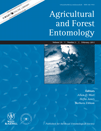
AGRICULTURAL AND FOREST ENTOMOLOGY
Bridging disciplines to enhance biodiversity and sustainability.AGRICULTURAL AND FOREST ENTOMOLOGY is a leading journal published by Wiley, focusing on the interface of entomology, agriculture, and forestry. With a robust impact reflected in its Q2 and Q1 quartile rankings in prominent categories like Agronomy and Crop Science, Forestry, and Insect Science, this journal serves as a vital platform for researchers and professionals seeking to advance their understanding of insect impacts on agricultural and forest ecosystems. Since its inception in 1999, it has provided a comprehensive collection of high-quality research, facilitating interdisciplinary discussions and innovations in pest management, biodiversity, and sustainable practices. Although it does not currently offer Open Access, the journal continues to uphold rigorous peer-review standards, ensuring that published works maintain a profound scientific value. As of 2023, its Scopus rankings further signify its prominence in the field, engaging a global audience keen on addressing the pressing challenges faced within agricultural and forest sciences.
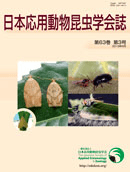
JAPANESE JOURNAL OF APPLIED ENTOMOLOGY AND ZOOLOGY
Unveiling the Secrets of Insect Behavior and EcologyJapanese Journal of Applied Entomology and Zoology is a premier publication in the field of Insect Science, offering a platform for researchers and practitioners to share their findings on applied entomology and zoology. Established in 1957 and published by the Japan Society of Applied Entomology and Zoology, this journal aims to foster the understanding of insect-related studies that impact agriculture, ecology, and biodiversity. With an ISSN of 0021-4914 and E-ISSN of 1347-6068, it serves as a crucial resource for both academics and industry professionals. While the journal currently resides in the Q4 category of the Scopus ranking for Insect Science with a percentile of 11th, it plays a significant role in providing valuable insights into insect behavior, systematics, and their ecological roles. Readers can benefit from its published research to drive innovations and solutions in pest management and conservation practices. As the journal continues to evolve, it reinforces its commitment to disseminating critical research that supports sustainable practices in entomology and zoology through its convergence extending to the year 2024.
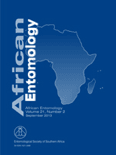
AFRICAN ENTOMOLOGY
Pioneering Research in Agricultural and Ecological EntomologyAFRICAN ENTOMOLOGY, published by the Entomological Society of Southern Africa, is a pivotal journal dedicated to the vibrant field of entomology and its related disciplines. With an ISSN of 1021-3589 and an E-ISSN of 2254-8854, it serves as an essential resource for researchers, professionals, and students interested in the intricacies of insect science across diverse ecological and agricultural landscapes. This journal, with a convergence of publications from 1994 to 2024, holds notable rankings, notably placing in Q2 for Agronomy and Crop Science and Q3 for both Ecology, Evolution, Behavior and Systematics and Insect Science as of 2023. The journal has made significant contributions to the knowledge and understanding of insect populations, their behaviors, and interactions within ecosystems, making it highly relevant for those engaged in agricultural practices and biodiversity conservation. AFRICAN ENTOMOLOGY welcomes original research articles, reviews, and special issues that broaden the dialogue surrounding entomological studies, and while it operates under conventional access policies, it remains an influential platform for scholarly discourse in Southern Africa and beyond.
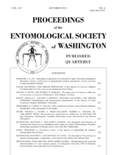
PROCEEDINGS OF THE ENTOMOLOGICAL SOCIETY OF WASHINGTON
Advancing the Frontiers of Insect ScienceProceedings of the Entomological Society of Washington is a distinguished journal dedicated to the field of entomology, published by the Entomological Society of Washington. With a rich history dating back to 1981 and a commitment to fostering scientific discourse, this journal serves as a vital platform for researchers and professionals specializing in insect science and ecology. It holds a respectable<> impact factor and is categorized in the Q3 quartile in both Ecology, Evolution, Behavior and Systematics and Insect Science, indicating its relevance within the scientific community. Although it does not offer open access, it provides a curated selection of high-quality research articles that significantly contribute to the understanding of insect biology, behavior, and taxonomy. The journal aims to bridge gaps in current research and inspire innovations in entomological studies, making it an essential resource for students, researchers, and practitioners in the field.

BULLETIN OF INSECTOLOGY
Exploring the Intricacies of EntomologyBULLETIN OF INSECTOLOGY is a prominent academic journal published by ALMA MATER STUDIORUM, UNIV BOLOGNA, Italy, specializing in the field of Insect Science. The journal, with ISSN 1721-8861 and E-ISSN 2283-0332, has established itself as a vital resource for researchers and professionals interested in the diverse aspects of entomology and its applications. It ranks in the Q2 category for Insect Science as of 2023, placing it among the top journals in its field with a Scopus rank of 79 out of 181. The BULLETIN OF INSECTOLOGY is committed to disseminating high-quality research and innovative studies, facilitating open dialogue and collaboration among scientists. As an essential platform for sharing groundbreaking findings, it contributes significantly to the body of knowledge in agricultural and biological sciences, making it an invaluable asset for scholars and practitioners alike. With coverage from 2002 to 2024, this journal continues to foster advancements in entomological research and its importance in tackling environmental challenges.

Insects
Advancing the Frontiers of Entomological ResearchInsects is a prominent open-access journal published by MDPI, dedicated to advancing research in the vibrant field of insect science. Since its inception in 2011, this journal has become a vital resource for academics and professionals alike, also ranked in the prestigious Q1 category within the Insect Science field by Scopus, achieving a remarkable rank of 26 out of 181 journals. With an ongoing convergence period from 2010 to 2024, Insects provides comprehensive coverage of various aspects of entomology, including but not limited to ecology, behavior, physiology, and applied entomology. Based in Switzerland, the journal promotes an open-access model, ensuring that vital research is readily available to researchers, practitioners, and students globally. This journal not only facilitates the dissemination of groundbreaking entomological research but also fosters collaboration and interdisciplinary dialogue in the field.
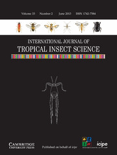
INTERNATIONAL JOURNAL OF TROPICAL INSECT SCIENCE
Connecting Scholars in Tropical Insect ScienceINTERNATIONAL JOURNAL OF TROPICAL INSECT SCIENCE, published by Springer International Publishing AG, is a leading interdisciplinary journal dedicated to advancing knowledge in the fields of insect science and ecology. With its ISSN 1742-7584 and E-ISSN 1742-7592, this journal provides a platform for researchers to publish high-quality, peer-reviewed articles that explore various aspects of tropical insect biology, behavior, and their ecological impacts. As evidenced by its Q3 ranking in both Ecology, Evolution, Behavior and Systematics and Insect Science, it plays a vital role in fostering scientific dialogue and innovation within these disciplines. Researchers affiliated with the journal benefit from its visibility and growing impact, as demonstrated by its Scopus ranks, with a percentile standing of 61st in Insect Science. Although the journal is not open access, it still reaches a wide academic audience, making significant contributions to our understanding of tropical ecosystems. Situated in Switzerland, this journal is crucial for students, professionals, and researchers invested in the intersection of entomology and ecological science.
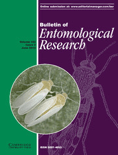
BULLETIN OF ENTOMOLOGICAL RESEARCH
Exploring the Intersections of Insects and InnovationBULLETIN OF ENTOMOLOGICAL RESEARCH, published by Cambridge University Press, is a prestigious journal that has been at the forefront of entomological research since its inception in 1910. With an impressive track record extending through to 2024, this journal serves as a vital platform for advancing knowledge in various related fields, notably Agronomy and Crop Science and Insect Science, where it ranks in the top quartile (Q2) and maintains a commendable position within the Scopus rankings in its categories. Notably, its contributions also intersect with Medicine in a broader scope, fostering interdisciplinary insights. While access to the journal content is not classified as 'Open Access,' its rigorous peer-reviewed articles are crucial for researchers, professionals, and students seeking to enhance their understanding of entomology and its applications in agronomy and beyond. The journal's impact is reflected in its notable percentile rankings, emphasizing its relevance and influence in the academic community. Located at the heart of the UK, the BULLETIN OF ENTOMOLOGICAL RESEARCH continues to be an essential resource for those dedicated to the study and understanding of insects and their impacts on agriculture and health.